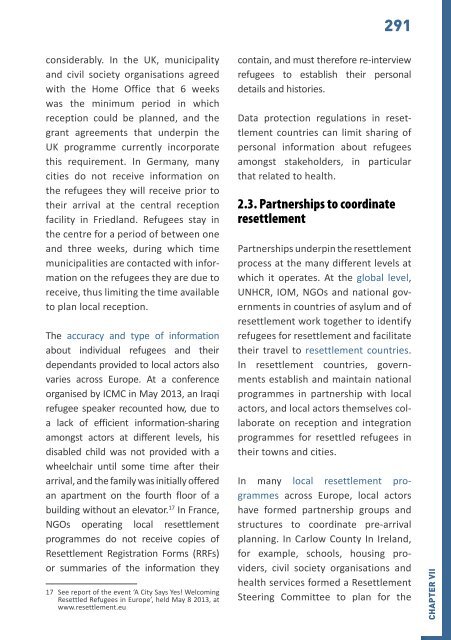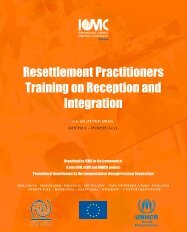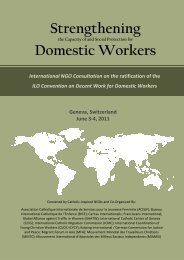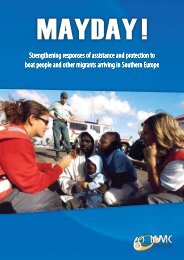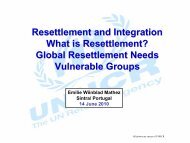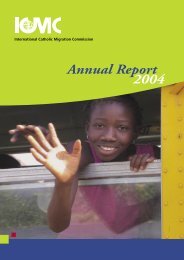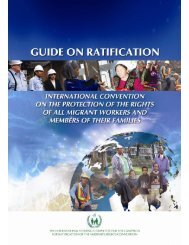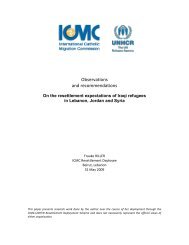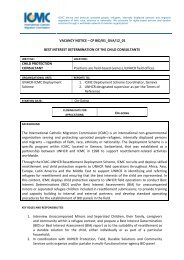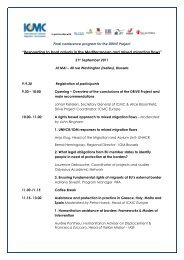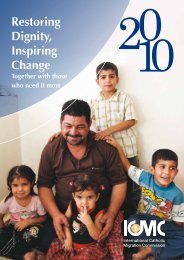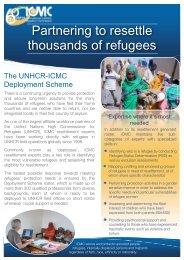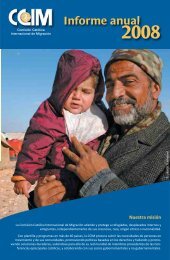ICMCEUROPE WelcometoEurope.pdf (5.89 MB)
ICMCEUROPE WelcometoEurope.pdf (5.89 MB)
ICMCEUROPE WelcometoEurope.pdf (5.89 MB)
Create successful ePaper yourself
Turn your PDF publications into a flip-book with our unique Google optimized e-Paper software.
291<br />
considerably. In the UK, municipality<br />
and civil society organisations agreed<br />
with the Home Office that 6 weeks<br />
was the minimum period in which<br />
reception could be planned, and the<br />
grant agreements that underpin the<br />
UK programme currently incorporate<br />
this requirement. In Germany, many<br />
cities do not receive information on<br />
the refugees they will receive prior to<br />
their arrival at the central reception<br />
facility in Friedland. Refugees stay in<br />
the centre for a period of between one<br />
and three weeks, during which time<br />
municipalities are contacted with information<br />
on the refugees they are due to<br />
receive, thus limiting the time available<br />
to plan local reception.<br />
The accuracy and type of information<br />
about individual refugees and their<br />
dependants provided to local actors also<br />
varies across Europe. At a conference<br />
organised by ICMC in May 2013, an Iraqi<br />
refugee speaker recounted how, due to<br />
a lack of efficient information-sharing<br />
amongst actors at different levels, his<br />
disabled child was not provided with a<br />
wheelchair until some time after their<br />
arrival, and the family was initially offered<br />
an apartment on the fourth floor of a<br />
building without an elevator. 17 In France,<br />
NGOs operating local resettlement<br />
programmes do not receive copies of<br />
Resettlement Registration Forms (RRFs)<br />
or summaries of the information they<br />
17 See report of the event ‘A City Says Yes! Welcoming<br />
Resettled Refugees in Europe’, held May 8 2013, at<br />
www.resettlement.eu<br />
contain, and must therefore re-interview<br />
refugees to establish their personal<br />
details and histories.<br />
Data protection regulations in resettlement<br />
countries can limit sharing of<br />
personal information about refugees<br />
amongst stakeholders, in particular<br />
that related to health.<br />
2.3. Partnerships to coordinate<br />
resettlement<br />
Partnerships underpin the resettlement<br />
process at the many different levels at<br />
which it operates. At the global level,<br />
UNHCR, IOM, NGOs and national governments<br />
in countries of asylum and of<br />
resettlement work together to identify<br />
refugees for resettlement and facilitate<br />
their travel to resettlement countries.<br />
In resettlement countries, governments<br />
establish and maintain national<br />
programmes in partnership with local<br />
actors, and local actors themselves collaborate<br />
on reception and integration<br />
programmes for resettled refugees in<br />
their towns and cities.<br />
In many local resettlement programmes<br />
across Europe, local actors<br />
have formed partnership groups and<br />
structures to coordinate pre-arrival<br />
planning. In Carlow County In Ireland,<br />
for example, schools, housing providers,<br />
civil society organisations and<br />
health services formed a Resettlement<br />
Steering Committee to plan for the<br />
CHAPTER VII


